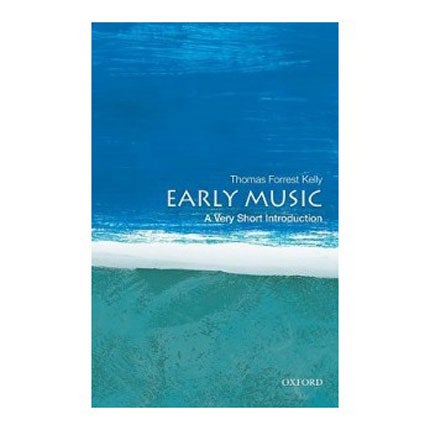Early Music: A Very Short Introduction, By Thomas Forrest Kelly
A perfectly pitched audio guide

What is "early music"? It used to mean earnest huddles of sandalled beardies playing crumhorns, serpents and sackbuts.
Today, it can mean Brahms, Mahler and Stravinsky performed by top orchestras, on instruments of the appropriate period. It means rediscovered repertoire and rediscovered performance styles and its historical span has widened dramatically; like "world music", early music has become a major industry.
When this book was announced, the only question was whether it would be any good. The answer, emphatically, is yes, and the author addresses both specialist readers and newcomers. As Thomas Forrest Kelly observes, the music of the past has many attractions, of which exoticism is only one. What did Gloriana dance to? What did the Sun King listen to at dinner?
At the beginning of the early-music movement, the more-authentic-than-thou brigade sought to impose its own brand of style fascism. Harpsichordist Wanda Landowska's notorious remark – "You play Bach your way, I will play him Bach's way" – encapsulated what made it so insufferable.
Rightly, Kelly stresses that the goal of all music-making must be to please the audience of its day, not some notional medieval audience. We can't unlisten to Wagner. Yet much of his book is devoted to the life-enhancing work of conductors, instrumentalists and singers who have revealed lost sound-worlds. Radio 3 may still use Steinways for the presentation of music written for harpsichords, but the latter instrument – with the clavichord, lute and viol – has been firmly re-established. Conductors like Nikolaus Harnoncourt and John Eliot Gardiner have breathed life into classics which had seemed stale.
This is a short book, but its surveys of medieval, Renaissance and Baroque styles are packed with illumination. I have never before read such a neat explanation for the (to some people) over-repetitiousness of Handel's operas. Kelly's account of the birth of the madrigal and motet comes like a shaft of light. His short section on pitch, tuning and temperament has exemplary clarity.
It is salutary to be reminded that the first Academy of Ancient Music was founded in London in 1726. The present early-music revival is nothing new, and it won't be the last.
Join our commenting forum
Join thought-provoking conversations, follow other Independent readers and see their replies
Comments